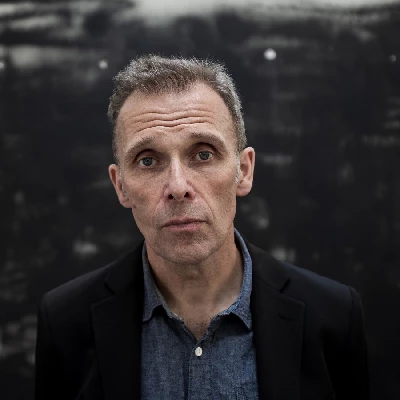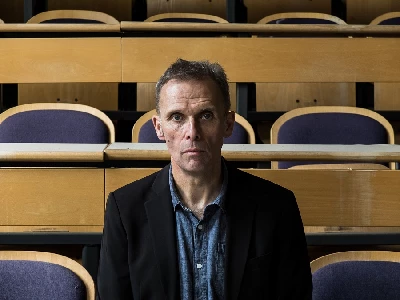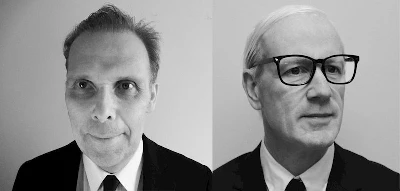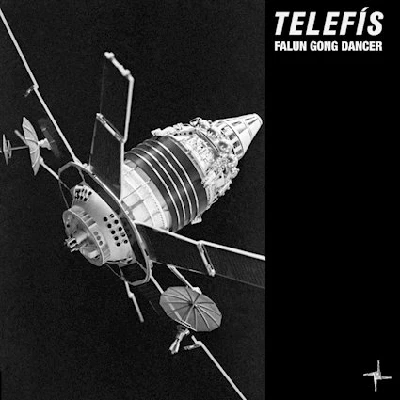published: 12 /
4 /
2022

Former Microdisney and Fatima Mansions frontman Cathal Coughlan talks to Eoghan Lyng about his new project Telefis and album with Jackknife Lee, political history, musical history and more.
Article
Cathal Coughlan doesn’t just sound like a man from Cork. In many ways, he embodies Cork. Like the city that birthed him, he flits from expressions of great admiration to moments of towering reflection, culminating in a dialogue that revels in spark, sincerity and soulfulness.
While Dublin can count on Bono for his incendiary remarks, and Derry can turn to Feargal Sharkey for guidance, Cork can very happily revel in Coughlan’s role as its musical spokesman. His accent is as strong as ever, which is interesting considering that he has lived in England for the best part of 40 years. And yet his fondness for the county seems to have only intensified with time, which might explain why Telefís – the band he currently co-fronts with producer Garret “Jacknife” Lee – symbolises the emblems of a city that has been through rebellion and resolve over the last hundred years.
“I’m told I first came across Jacknife Lee when I was in the throes of doing the Vox [magazine] cabaret with Microdisney at the Ivernia Theatre in Cork. Mr. Lee played that night. He was a bit younger than us, and there was a huge amount of loosely-organised coming and going from the stage. But the first time I remember noticing his music was another time in Dublin just as we were moving to the UK. He was conspicuously talented, it has to be said. He was something of a prodigy, really, doing stuff that you wouldn’t readily think a teenager might be doing musically. He was very evolved.
“And then I just bumped into him occasionally over the years, and I was aware of some of the things he was doing. It just so happens that he was working with Luke Haines, who is a friend of mine, and Jacknife was basically dismantling the first Luke Haines & Peter Buck album, and making something else out of it. It was more than a remix, really. Something quite distinct. I was up with Luke one day, as he was playing some bass and guitar on my album, and he mentioned that this was going on. Basically, Luke put us back in contact.
“I hadn’t quite finished my album at that time so the two projects sort of dovetailed into one another, which was great, because you don’t want things to stop all of a sudden, really, especially with a pandemic going on.”
Coughlan has a deep understanding of the island that seeped into Yeats’s yearning poetry and furnished a countercultural movement based on fairness, ferocity and feminism: Microdisney’s ‘We Hate You South African Bastards!’ typified the sentiment of a nation disgusted by the apartheid regime and Europe’s general ambivalence to it. Yet he’s not afraid of scrutinising what he sees as questionable policies from a country that was once deemed one of the more conservative in the west.
Many readers will recognise Lee from his work with U2, and Coughlan’s band Fatima Mansions supported the Dublin giants on their early-90s Zoo TV tour. “For our generation, especially if you spent time in Dublin, there were varying degrees of connectivity to the leviathan that U2 became. Obviously, very few people worked with them with the distinction that Jacknife Lee did, but at the same time, that’s kind of a given, really. It hardly ever comes up in conversation.”
He surprises me by adding: “The first time I played support to U2 was 1980. It was the original Microdisney, and we were pretty bad. We didn’t handle ourselves well. I think it was just after their first album had come out. I’m not casting aspersions on anybody else, but I guess I’m just saying that none of the gold dust really rubs off on you. What U2 have achieved, they’ve achieved for themselves, especially the way they went off to America, and worked their arses off. They were never going to be as cool in the UK as the Manchester or Liverpool bands of the post-punk time, for example, but they had something going for them in America that many UK bands didn’t, which was that they weren’t put out by being in front of ‘uncool’ audiences, and they enjoyed playing live. I think The Bunnymen, for example – great as they have been – were always a bit more torn about touring and just doing a lot of gigs, you know.”
But that was then, and this is now. Considering how rooted Ireland is in its past, Coughlan seems to make a concerted effort to focus on the present. I ask him about his level of Gaeilge (Irish): “I would not pretend to be up to ollscoil [university] level in terms of Irish vocab, or graméir, but especially for many of us who grew up in the 1960s and 70s, we’re confined to the “municipal Irish”, as distinct from the Gaelic culture that has existed since time immemorial. That municipal Irish is of some interest in its own right. It’s there for affectionate ribbing, really.”
Telefís’s album ‘A hAon’ represents what should be the beginnings of a series of exploratory music. From the glistening vocals to the barren brushstrokes that decorate the soundscapes, the album plunges listeners into a world bouncier than the locked-down Covid streets that surround them.
Is there a touch of the David Byrne to the work? “Well, no, I don’t think there is. It hadn’t crossed my mind. We are occupying some similar territory in that the tracks are mostly based on grooves on one kind or another. You don’t want to be putting in too many chord changes, or Victorian chocolate-box affectations over the top. So, there was a challenge to make a vocal work in that environment, and of non-African American singers, the two people you mentioned [Byrne and Peter Gabriel] are probably the more celebrated examples. So you can’t help doing some of the same things.”
The conversation then pivots into another territory: Talking Heads, he feels, are sharply defined in their mission statement. “You have to really dig, if you can,” he says. What about Fela Kuti? “That’s very flattering. I know Jacknife is very influenced by modern African music. He collaborated with a couple of really interesting African artists on his solo album last year, and he’s just done a collaboration album with Rokia Koné, so I know he approaches African music from a modern angle. He does not approach it as exotica, so that probably seeps into the grooves of [album tracks] ‘Archbishop Beardmouth At The ChemOlympics’ and ‘Ballytransnational’.”
When I hear the album, I don’t hear conventional rock. I hear snippets of John Banville, John Buchan, Edward Lear and John Lennon. Lear and Lennon being torchbearers of surrealist poetry, I ask Coughlan whether he sees the connection: “I’m more symbolist than surreal. I never really got Edward Lear. Lennon, I got a little bit, but I never really delved into his printed stuff at all. But as pop lyrics go, the likes of ‘I Am The Walrus’ and ‘Come Together’ – you can’t be in music, and not have been exposed to it. And that’s a few years after they came out, because RTÉ’s playing of The Beatles was mainly ‘She Loves You’, ‘Penny Lane’, ‘Yesterday’, ‘Paperback Writer’. Which was good. I definitely benefitted from not having a rock and roll upbringing. But to answer your question, I’m not so much a creature of surrealism, but parallax free association.”
He senses that I’m confused, so he reiterates that he’s not too concerned with literal meaning. The most important thing, he says, is to have the subject under control. Cork laces the album together, and thanks to a combination of Google Maps and mental maps, Coughlan was able to piece together a portrait of his native country in glorious, kaleidoscopic pastels. “A lot of pivotal events in my life have happened there,” he chuckles. “The masonry is only less than 50 per cent of it. The human architecture is the main thing, really.”
Coughlan does have time for Flann O’Brien ("perverted transcendence in the grey landscape of Ireland”) whom he praises for his idiosyncratic view of his environment. Like James Joyce, Brendan Behan and Samuel Beckett, Coughlan translated his view of Ireland into a series of vignettes. "I feel lucky to have grown up in a time when we had people to collaborate with, who were definitely not from the right sides of the tracks, but who had just as great a contribution to make."
I ask Coughlan about the Cork indie comedy ‘The Young Offenders’ which offered British audiences a more raucous, incendiary look at the place. “It very much does harp on about one type of working class life,” Coughlan cackles. “It’s intentionally cartoonish. It doesn’t even seek to do what genre fiction has done for the place, not to mind literary fiction. But it’s something I’ve enjoyed. To have a greater appreciation for that side of life, I’ve become an aficionado of The Two Norries podcast. Which I think is really terrific: serious, but candid, and tells me lots of things about life in Cork.”
The Two Norries opened Coughlan’s eyes open to the treasures that lies within the place Cork people still proudly declare “The Real Capital. “It is a very colourful place, which can be good and bad.”
Although he’s unconvinced that any airport needs to be renamed, he agrees that Rory Gallagher deserves the recognition. “There has been no unfavourable reappraisal,” Coughlan says, praising how evolved the guitarist was. “He came from that hinterland of showbands, and of playing in an Our Lady’s hospital for the residents. And all this other colour, having lived up in Donegal. Optimistic, part of a time in Cork that has been forgotten by the Celtic Tiger.” Coughlan suggests that Bob Dylan “copped” from Gallagher and Liam Clancy, before suggesting that the Clancy Brothers were brushed aside by the music industry for their taste in jumpers.
“This album was done entirely during the first lockdown, and it was done between London, where I was, and Los Angeles, where Jacknife lives. It was pretty easy, because of technology. If you were still having to post tapes back and forth, and all kinds of stuff we take for granted these days, well, it just wouldn't happen. Like, for example, that Joan As Police Woman album with Tony Allen and Dave Okumu [‘The Solution is Restless’, released in November 2021].” He's quick to point out the silver lining that emerged from lockdown, and ‘a hAon’ can happily sit beside such glowing pandemic offerings as ‘McCartney III’.
As Coughlan and I know only too well, Ireland has risen and fallen in spectacular form over the last hundred years, shifting from economic powerhouse to paltry economy – boom to bust, bust to boom. “At the beginning of Telefís, we conflabbed about common Irish cultural points, because I certainly wasn't going to write a load of lyrics that were all my personal predilections. I was looking for what we both have. He has a polymathic outlook on the things that he does. He's done all the graphics, and we knew there was something of a collision between the pagan imagery, the Goddess imagery of the Cross, and the municipal post-Sean Lemass environment that we'd both grown up in. We needed to mine it."
I can't quite picture Lemass. “He was Taoiseach [equivalent of Prime Minister] in the 1950s. He broke away from de Valera's prior Orthodoxy in favour of a more industrialised economy. de Valera was kind of the Irish Pol Pot, in a way. His worldview was very agrarian. It was the sentiment of an exile. I mean, he was born an Irish American with a Spanish father, so the view of the homeland was always going to be a bit impractical. And in practice it proved disastrously so, sovereignty aside.”
Coughlan makes it clear that Lemass wasn't perfect either, but says he was pivotal in forming the modern Éire. "Even just putting in a media industry: a television station, as opposed to just a radio station. One of each!"
Lemass was the Taoiseach of his birth, but Lee is a child of the Jack Lynch era [Taoiseach from 1966 to 1973 and again from 1977 to 1979]. "We both recalled the way Telefís Éireann [Ireland’s first TV channel, run by national broadcaster RTE] worked when we were young. They made a lot happen, with not much money. There was a lot of original content: ‘Lambert Puppets’, ‘Murphy agus a Cháirde’, ‘Wanderly Wagon’. I used to hide behind the couch whenever ‘Murphy agus a Cháirde’ [‘Murphy and His Friends’, a puppet show about a giant] would come on. It did seem stark, at least with hindsight."
Musing on the memories, Coughlan suggests that the world is witnessing what he calls “corrosive nostalgia”. “The ideological thrust that the pre-pandemic world has to be preserved is very, very pronounced in Britain, and it's beginning to creep in a bit in Ireland since Micheál Martin took over, I feel.”
Coughlan is clearly no fan of [1980s-90s Taoiseach] Charles Haughey, and opines that the Celtic Tiger influenced the modern day housing crisis: “Central government politics in Ireland is a very strange beast, as you know. I think we would be here all day [if we went down that route]. A lot of the problems, since the 70s, have been down to the clientelist approach: 'Vote for me, you'll get your boreen tarmacked, a small factory in your town, we'll take care of you, and you'll be grand! Forget the big stuff, leave it to us.' I don't think it's quite as naked as it used to be in Ireland, but it's really come in, in the UK now, really!”
“I don't claim to have an informed view of Ireland,” he sighs. “I haven't been there for two years, and that was not by choice. So, a lot of it is by memory: I hope it's not too dewy-eyed. I keep up with the media in ways that I think are helpful, and I try not to look at it through rosy spectacles, but the things that really pissed me off about Ireland in the 80s are happening here in the UK now like never before."
Telefís embrace the past but aren't following it slavishly. Instead, it's a jumping-off point by which they can create their patchwork. “We're working on a follow up album at the moment. We're most of the way through it. It's been a great thing for me: for logistical reasons, I've found it difficult for my solo stuff to come entirely to fruition this year, so working on ‘Teilifís a Dó’ has been really terrific. It's a bit lusher in places, and a bit rawer in places, than the first one, so it takes off two ways really.”
"I'm just looking here at another example, at the 'Symphonies of Danny La Rue'. I guess you would have to call him Anglo-Irish, even though he was born working class in Cork, and the song doesn’t so much reflect that fact of his existence, but the way he was regarded in Ireland when I was growing up." Coughlan pauses, then continues: "Really, it's about appropriating someone's image, and pretending that the implied ridicule itself has something to say. In that song, the protagonist is deeply flawed in his own right, and he feels almost that the flippancy of Danny La Rue, and juxtaposing it with an idea of high culture is going to make him seem like a smarty-pants with social commentary to make. That's a pitfall that many of us, myself included, fall into."
Will Telefís tour? "I'm going to give a very clichéd answer: it's too soon to say. The idea of doing something after, with two albums under our belt, has added appeal, but the logistics are a bit mad, with a pandemic hovering. I just want to get out and play again to whoever. Luckily, I went from the last solo album to Telefís, but we wouldn't want that to be the entire story of the next five years, because none of us are getting any younger. "
He may not have youth, but the gab is as gifted as ever: Go mbéirimid beo ag an am seo arís!
Band Links:-
https://cathalcoughlan.com
https://www.facebook.com/cathalcoughla
https://twitter.com/realcathalc
http://telefis.ie/index.html
https://www.facebook.com/telefis1961
https://twitter.com/telefis1961
Play in YouTube:-
Picture Gallery:-



Visitor Comments:-
|
|
2428 Posted By: Eoghan Lyng, Ireland on 26 May 2022 |
The ending "go mbéirimid beo ag an am seo arís" translates as "may we be alive at this time again", which is sad considering Coughlan's untimely death only months after the interview.
But what a body of work he left the world, not least the Teilifis project. May he rest in peace.
|